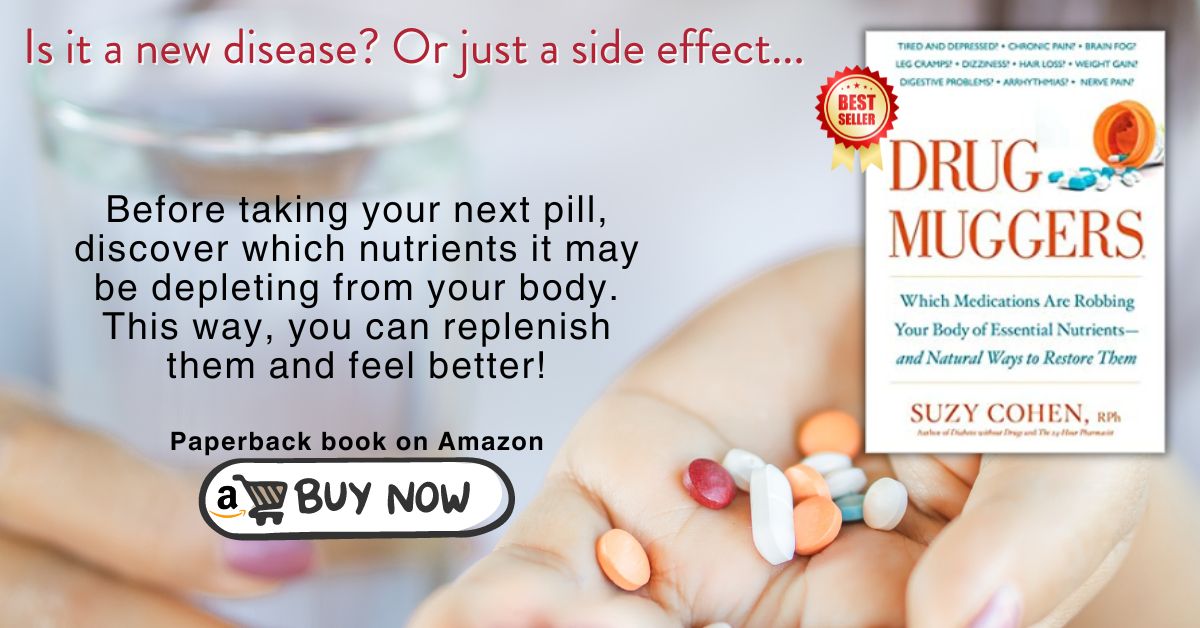What's On This Page?
ToggleGrapefruit is a sour, but delicious fruit that many people love to eat, but it can come with some interactions. I received a question from Sebring, Florida via my syndicated column. Here’s a thought-provoking look at grapefruit’s interactions.
Dear Pharmacist Suzy,
The Reader’s Digest says grapefruit juice is not compatible with my cholesterol medication, Zocor. I am worried because I enjoy it so much. Should I stop eating grapefruit?
So the short answer to this is NO. You should stick to your normal eating habits, even if grapefruit is part of that routine. It does contain chemicals that alter the effect of enzymes in the body, and that may result in higher levels of medicine in the bloodstream.
However, the body is capable of adjusting itself, and will do so if you eat the fruit or drink its juice regularly. Furthermore, your physician can make medication adjustments. It just depends on the drug you take. Complete avoidance IS sometimes needed depending on the medicine you take.
If you think grapefruit is the only fruit that interacts with medicine, it’s not. Consider reading about five other fruits that could be problematic: 5 Fruit Interactions With Medications: What You Need To Know To Stay Safe.
Compounds in Grapefruit
Naringenin is a primary compound in grapefruit responsible for its known interactions with certain medications. As a flavonoid, naringenin inhibits the activity of cytochrome P450 3A4 (CYP3A4) enzymes in the small intestine, which are essential for metabolizing many drugs. Inhibition of these enzymes can result in higher blood concentrations of medications, potentially increasing the risk of adverse effects.
Additionally, grapefruit contains furanocoumarins, including bergamottin, which also inhibit CYP3A4 enzymes. Interestingly, the essential oil of Bergamot, derived from a different type of citrus, contains bergamottin as well. The combined action of these compounds makes grapefruit particularly potent in affecting drug metabolism, much more so than other citrus fruits, which contain similar compounds but in much lower concentrations.
Occasional vs Consistent Intake
In this case, a food-drug interaction is more likely to happen if you only occasionally consume grapefruit. Under those circumstances, the level of medicine in your bloodstream may suddenly spike. Also, you shouldn’t suddenly stop eating it either. That, too, could have an adverse effect.
Grapefruit’s effect on medication was discovered during a 1991 study on the effects of mixing alcohol with a blood pressure medication. During testing, the juice of this lip-puckering fruit was used to mask the taste of alcohol in tests, and researchers inadvertently discovered that grapefruit juice caused the levels of medication in the bloodstream to skyrocket. This effect is not seen with other citrus fruits. ZOCOR is not the only affected medication.
You may be interested in my new article, 5 Surprising Ways Fig Fruit Extract Helps Glycemic Control and Cholesterol.
Medications that Interact with Grapefruit
Here are a few other medications that the fruit interacts with:
1. Statins (Cholesterol-Lowering Medications)
- Atorvastatin (Lipitor)
- Simvastatin (Zocor)
- Lovastatin (Mevacor)
If you have high cholesterol or take a statin drug, consider reading my article on this topic, Can Vitamin C Replace Statins? 3 Potential Benefits For Cardiovascular Health.
Another article you might like is The Scary Statin and Thyroid Connection.
2. Blood Pressure Medications
- Nifedipine (Procardia, Adalat)
- Losartan (Cozaar)
- Amlodipine (Norvasc)
3. Anti-Anxiety Medications
- Buspirone (BuSpar)
- Diazepam (Valium)
- Sertraline (Zoloft) (Note: Sertraline has a minor interaction)
If you have anxiety, consider reading my article on this topic, 16 Natural Treatment Options For Occasional Anxiety.
4. Antihistamines
- Fexofenadine (Allegra)
5. Antiarrhythmic Drugs
- Amiodarone (Cordarone)
6. Immunosuppressants
- Cyclosporine (Neoral, Sandimmune)
- Tacrolimus (Prograf)
7. Erectile Dysfunction Drugs
- Sildenafil (Viagra)
- Tadalafil (Cialis)
- Vardenafil (Levitra)
8. Anticoagulants
- Clopidogrel (Plavix)
9. Pain Medications
- Methadone
10. Other Medications
- Certain antifungal drugs (ie ketoconazole, itraconazole)
- Certain antibiotics (ie erythromycin)
- Some medications for irregular heart rhythms (ie quinidine)
This list is not exhaustive, and the degree of interaction can vary based on the amount of grapefruit juice consumed and individual patient factors. It’s crucial you consult with your practitioner about diet, including your grapefruit intake. This is especially important when starting new medications.
Summary
If you want to know whether a medication you’re taking can be affected by grapefruit, ask your pharmacist if the drug will interact with Erythromycin or Sporanox. Because these two drugs act similar to the sour fruit in your bloodstream, odds are the fruit will have a similar effect with your medication.
In other words, if what you are taking interacts with either Erythromycin or Sporanox, it’s a good bet that grapefruit will interact also. Another option is to buy my Drug Mugger book, it has a rather extensive chart in it showing the interactions of grapefruit juice with medications, and it has about 60 pages devoted to foods and drinks that interact with hundreds of different medication.

Suzy Cohen, has been a licensed pharmacist for over 30 years and believes the best approach to chronic illness is a combination of natural medicine and conventional. She founded her own dietary supplement company specializing in custom-formulas, some of which have patents. With a special focus on functional medicine, thyroid health and drug nutrient depletion, Suzy is the author of several related books including Thyroid Healthy, Drug Muggers, Diabetes Without Drugs, and a nationally syndicated column.


